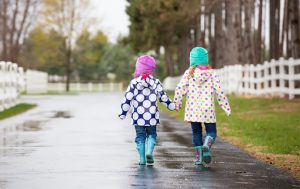How Safe is Your Home? 12 Tips to Help Keep Your Kids Safer Around the House

We all know that making sure your home is safe is important, especially for kids. But do you know how to make your home as safe as possible? There’s a lot of info we didn’t know, so we partnered up with the Electrical Safety Authority and looked into it. Whether you follow every rule to the letter, or just want to inform yourself on what you could do around the house, here are a whole bunch of ways you can help make your home safer for your family.
Reduce the risk of shock
Did you know that there is really no such thing as a safe electrical shock? Even low-voltage shocks can have long-term effects. And because kids are especially curious and are natural explorers who get their hands on everything, they’re at risk of getting a shock. Try taking a look around your house and replacing any missing or broken cover plates to start. You’ll also want to install tamper-resistant (TR) receptacles because they have special shutters that cover the plug slots and help prevent little fingers or objects from going into the outlet.
Check all your cords
Replace any frayed cords and be sure to store all cords away from places that little hands and mouths can get at them.
Teach older children how to plug in and unplug safely
That means they should know to never overload outlets by plugging in too many cords. Use an approved power bar that has surge protection instead and when it’s time to unplug, don’t yank cords from the wall.
Install smoke alarms & carbon monoxide detectors
For the most coverage and protection, install both smoke and carbon monoxide alarms outside of each bedroom as well as on each level of your home—and in the furnace area. Be sure to keep them at least 15 feet away from fuel-burning appliances, and test your alarms at least once a month to make sure they’re working properly. It’s also a good idea to replace the batteries every year.
Keep window blind cords out of reach—even past the toddler age
Loose cords on window blinds and curtains are a risk to babies, toddlers and older kids and should be kept out of the way of beds and cribs especially. It’s a great idea to switch out your window coverings to cordless options. Or, if that’s not possible, use clothespins or cord clips to store them well out of reach without loops or knots.
Come up with a ‘family fire plan’
As a family, discuss fire safety and come up with a plan in case of a fire in your home. It’s a great idea to map out at least two exit routes and be sure everyone understands them. Even better if you can practice your escape plan.
Make sure everyone knows how to use your fire extinguisher
First, is your fire extinguisher actually working? (You may want to check that regularly!) And then ensure that all family members know how to use it.
Safety-proof your kitchen
Depending on the age of your kids, you may want to install a stove lock, have knob protectors on the stove knobs, install an anti-tip bracket on your oven, and even ensure all plastic bags are stored out of reach.
Make rooms with water shock-free
Water and electricity are obviously not a mix. Install Ground Fault Circuit Interrupters (GFCIs)—the ones with the reset button—in any room with water, like the bathrooms, the kitchen and the laundry room.
Protect your kids around pools
Having climb-proof fencing that’s at least 5 feet high on all sides of the pool is an important step to making the pool area safer. You also may want to look into a self-closing gate with a childproof lock. And if the pool can be accessed through a door to the house, you might want to have a door alarm installed as well.
Check your secondhand baby equipment
Any used or hand-me-down baby gear should be checked to make sure it hasn’t been recalled and to ensure it’s all in-tact.
Hire an expert
If you have any electrical work that needs to be done in your home, hire only a Licensed Electrical Contractor to do the work.
If you or someone you know receives a shock, seek medical attention. This post was created in partnership with the Electrical Safety Authority, but the opinions are our own.
















When it comes to our children, we really want to protect them at all costs– I’m extremely grateful for this post you shared here! Making sure everything’s fireproof and that everyone knows how to use/do safety measures is what can make a huge difference when it comes to crises like these! Thanks for this post!